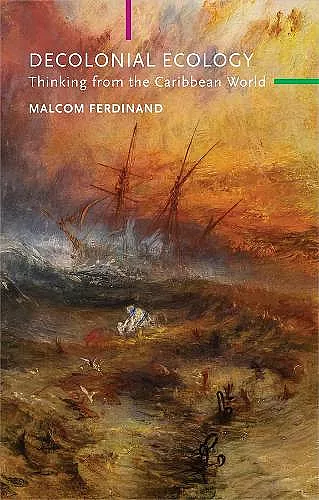Decolonial Ecology
Thinking from the Caribbean World
Malcom Ferdinand author Anthony Paul Smith translator
Format:Paperback
Publisher:John Wiley and Sons Ltd
Published:26th Nov '21
Should be back in stock very soon
This paperback is available in another edition too:
- Hardback£60.00(9781509546220)

The world is in the midst of a storm that has shaped the history of modernity along a double fracture: on the one hand, an environmental fracture driven by a technocratic and capitalist civilization that led to the ongoing devastation of the Earth’s ecosystems and its human and non-human communities and, on the other, a colonial fracture instilled by Western colonization and imperialism that resulted in racial slavery and the domination of indigenous peoples and women in particular.
In this important new book, Malcom Ferdinand challenges this double fracture, thinking from the Caribbean world. Here, the slave ship reveals the inequalities that continue during the storm: some are shackled inside the hold and even thrown overboard at the first gusts of wind. Drawing on empirical and theoretical work in the Caribbean, Ferdinand conceptualizes a decolonial ecology that holds protecting the environment together with the political struggles against (post)colonial domination, structural racism, and misogynistic practices.
Facing the storm, this book is an invitation to build a world-ship where humans and non-humans can live together on a bridge of justice and shape a common world. It will be of great interest to students and scholars in environmental humanities and Latin American and Caribbean studies, as well as anyone interested in ecology, slavery, and (de)colonization.
“Malcom Ferdinand brilliantly breaks away from the spider web of canonical ecological narratives and arguments. The wrongdoing of modernity is diagnosed from the decolonial Caribbean experience of coloniality. Decolonial Ecology reveals – through the power of storytelling – that the sacralization of reason, statistics, and mega-data has prevented us from realizing that ecological and colonial problems cannot be solved within the blindness of the Western modernity that created the problems.”
Walter D. Mignolo, author of The Politics of Decolonial Investigations
“This book is a powerful political and scholarly statement that exposes, in order to undermine, reductive enframings of modernity that themselves sustain epistemological barriers between groups that should be on the same side. Its richest contributions lie in the Caribbean-inspired, creolised deployment of political concepts, and of thinkers such as Hannah Arendt, Henry David Thoreau, and Jean-Jacques Rousseau. For example, Ferdinand spends considerable time building the conceptual framework of “the Maroon” from the history and modern-day descendants of escaped slaves – people who rejected their oppression and had to live off the land and forge a new creolised culture and identity in the mountains – to build a fresh ecological political theory of freedom. […] The book is a provocation to those thinkers who stress the importance of thinking about the environment through the perspective of geological time, which is a temporal horizon that considers the details of events like colonialism to be insignificant on a planetary scale. Ferdinand’s work is a vehement rejection of that move, an insistence that any thought about modernity’s “crisis” must start with the racist and ecocidal violence of colonialism that created it.”
Grace Garland, Environmental Politics
Environmental Values
ISBN: 9781509546237
Dimensions: 213mm x 137mm x 20mm
Weight: 386g
300 pages